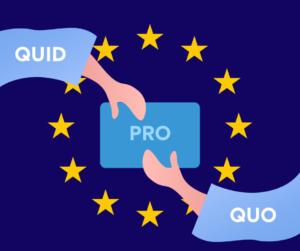Headquarters: Svetog Nauma 7, 11000
Office address: Đorđa Vajferta 13, 11000
Phone:: +381 11 4529 323

The US presidential elections are officially over – Joe Biden won. Yet, things are far from over in terms of election frenzy, particularly as the outgoing President Donald Trump continues to refuse to concede by challenging the election results. For those following US politics, this comes as no surprise, particularly as Trump has repeatedly refused, throughout the past year, to commit to a peaceful transition of power if he loses the elections. The fact that it is now happening, with his disinformation attempts to create distrust in the US’ electoral process, and attempts to prolong his stay in power, creates a dangerous precedent – not only as the world is watching, but the Western Balkans populists as well. The fact that they are watching is worrisome, considering that the region already strongly suffers from sluggish European integration process.
Peaceful transition of power is one of the preconditions for a democracy; without it, the regime is merely a competitive authoritarian state. Even though Trump is doing his best to stay in the White House, he will certainly leave it in January 2020, as the US is known for its long-term and stable institutions which will guarantee that the rules and procedures are implemented. What will happen, however, if populists from the Western Balkans decide to follow Trump’s approach to elections? Imagine a scenario in which an opposition manages to win the elections against the one-man regime, despite all odds – what will stop the incumbent from making the same claims as Trump? In countries with weak rules or even weaker institutions to enforce those rules, such as the Western Balkan countries, the refusal of a peaceful transition of power could have catastrophic consequences. This would damage their path towards the EU, particularly as the stability of institutions guaranteeing democracy and the rule of law represents the key accession criteria, as outlined by the Copenhagen European Council back in 1993. For this reason, the true danger of Trump’s chant “stop the count” during the election night, accompanied by his post-election series of tweets and statements claiming that the elections were rigged, lies in its power to legitimise the same pattern of behaviour in other parts of the world.
Therefore, such a scenario is not only possible in weak states in Asia or Africa, but in Europe as well, whose citizens often take the basic democratic principles for granted. In that regard, Europe has its own set of populists – Viktor Orbán in the EU, and Aleksandar Vučić outside of the EU. The common denominator between these leaders is their strong popular support and their lack of emphasis on the rule of law. In fact, as of 2020, the countries they are leading, Hungary and Serbia, accordingly, are both considered as “hybrid regimes” by Freedom House. As the change of power is nothing but a fairy tale in these countries for the foreseeable future, the local pro-democratic forces and civil society, but also the EU member states and EU institutions, need to work more than ever to re-emphasize the importance of the idea of peaceful transition of power. For when the time comes, countries will not be able to afford a Trump-like post-electoral behaviour. Not only would it poison the public discourse, like it did in the US, but it would threaten the possibility of change of government taking place at all. By using the Trump-like tactics, the incumbents might delegitimise the opposition to the extent that this would prevent a peaceful transition of power and call for another election. This is not just a worst-case scenario, but a reality, particularly considering that Serbia and other regional countries are already considered as countries that show “clear elements of state capture”, as indicated by the European Commission in 2018. In that manner, the more the Western Balkan leaders continue growing the seeds of state capture, the further away will their future EU membership be.
In fact, on 16 November 2020, Mr Milorad Dodik, the Serbian representative in the trio presidency of the Bosnia and Herzegovina, tried mimicking Trump’s post-electoral behaviour to his advantage. After Dodik’s party lost in Banja Luka, the capital of the entity of Republic of Srpska, he started arguing how he will work on stopping all of the investments and subsidies to the city, as a way for him “not to forgive” those citizens who turned their back on him, while adding that “now we can start learning from the Americans” – thus directly referencing the post-electoral developments in the US. This is a clear example of how Trump-like behaviour can have detrimental effect in the region and thus damage its EU perspective. In that regard, Dodik even stopped short, like other populist leaders like Russia’s President Vladimir Putin, or China’s President Xi Jinping, from issuing a congratulating note to the President-elect Joe Biden as he questioned the results of the US elections. By doing so, Dodik has openly indicated that he stands by Trump’s electoral tactics and endorses his post-electoral behaviour. This was just one recent example and more of such can be expected in the future. As the EU is a player with significant political and economic capital in the Western Balkans, it should clearly state that it will not tolerate any Trump-like tactics from the Western Balkan leaders, while clearly reaffirming that the rule of law developments will remain an essential part of the EU integration process.